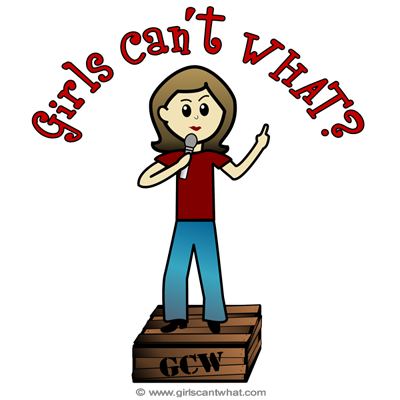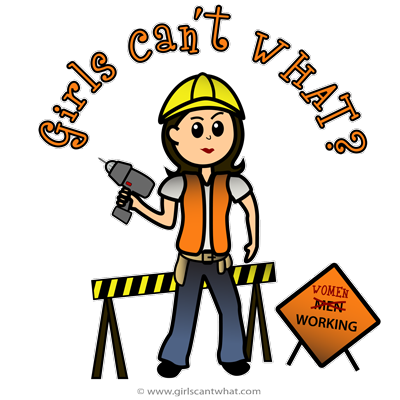WARNING: I make NO apologies for the heavy-duty thinking you are about to encounter. ;)
Over the last 5 years since Girls Can’t WHAT? was created, this blog has conjured up a pretty interesting batch of controversial topics. Frequently, during the debates that break out in the comments, someone will point out that the opposing side is not being open-minded. This goes back and forth with both sides saying that the other isn’t being open-minded until we all want to beat each other up. Kind of ridiculous, isn’t it?
 With the topic of “open-mindedness” on my brain, I started looking into what really makes a person “open-minded”. Is there some criteria we can use to determine just how open-minded someone is being? I Googled, I went to the library, I dug around and lo and behold, there is something by which we can determine open-mindedness. And here it is…It all hinges on asking yourself the following question:
With the topic of “open-mindedness” on my brain, I started looking into what really makes a person “open-minded”. Is there some criteria we can use to determine just how open-minded someone is being? I Googled, I went to the library, I dug around and lo and behold, there is something by which we can determine open-mindedness. And here it is…It all hinges on asking yourself the following question:
What would it take to change my mind on this topic?
If you have an answer, then you are open to changing your mind because you know what criteria you need to switch to the other side. Congratulations, you are open-minded.
If your response is “Nothing” then you are not open to change and therefore you are close-minded on that topic.
So what? I’m still a rock star…
 The trick here is to really think through the topic and determine what it is that would make you change your mind. Even if you can’t think of something right away, you should at least continue to contemplate what your answer will be. Why? Because if you can’t articulate what it would take to alter your thinking, then you cannot effectively communicate with the opposing side. I’m sure there is some theory or psychobabble behind that, but to me it’s just plain common sense.
The trick here is to really think through the topic and determine what it is that would make you change your mind. Even if you can’t think of something right away, you should at least continue to contemplate what your answer will be. Why? Because if you can’t articulate what it would take to alter your thinking, then you cannot effectively communicate with the opposing side. I’m sure there is some theory or psychobabble behind that, but to me it’s just plain common sense.
This does not mean you have to accept the opposing view as is. What you are trying to discover here is exactly what aspect of the opposing view has to be changed or made clear to you in order for you to accept it. If you can tell us why you believe in something, you also need to be able to tell us why you don’t accept the opposing view. You don’t have to switch sides or change your mind, but you do need to know what benefits or changes need to be present for you to embrace the opposing viewpoint. As long as your answer is “nothing” then you are being close-minded to finding a solution to the problem. That’s a hard concept to swallow.
I Hate Coffee
As usual, I applied this to a variety of topics to discover my own level of open-mindedness. For example, I am a complete coffee snob. Does that mean I am close-minded to drinking coffee because I refuse to try different kinds? I thought I might be because frankly, I just can’t stand the stuff.
So what would it take to make me drink coffee?
 In my case, I don’t like the taste or smell of coffee. But if you could show me that drinking coffee would suddenly have some kind of massive health benefit – like say, cure the arthritis in my back – then I would be willing to invest in a few Starbucks extra grande mocha frocha whatevers a week.
In my case, I don’t like the taste or smell of coffee. But if you could show me that drinking coffee would suddenly have some kind of massive health benefit – like say, cure the arthritis in my back – then I would be willing to invest in a few Starbucks extra grande mocha frocha whatevers a week.
There are probably a lot of reasons I could come up with that would make me drink coffee that aren’t near as far-fetched or based on medical cures. There are also a lot reasons I could come up with that wouldn’t be worth it to me either. But the fact that I can name something that would cause me to alter my view shows that I am open-minded to becoming a latte lover.
Want an even bigger challenge?
Ok so my coffee example may be a bit extreme. To date, no one has claimed that coffee can cure arthritis and even if someone has made that claim it has not been scientifically proven. But here is my theory…the more realistic (meaning feasible) of an example you can give for changing your viewpoint, the more open-minded you are. That doesn’t not mean you have to agree with the opposition or switch sides. It doesn’t mean you are wishy-washy or walking a fine line either. It simply means you know exactly what needs to change for you to resolve the issue. And the more realistic you can be, the easier it will be for you to communicate that to others in terms they can understand. That is a key point. ;)
 I am certain we could all come up with endless topics and examples so I encourage you to start thinking about what you believe and why you believe it.
I am certain we could all come up with endless topics and examples so I encourage you to start thinking about what you believe and why you believe it.
Then ask yourself…are you really open-minded about it?

3 comments
Kel1
I don’t remember reading this topic before! :) Must’ve missed it.
“I think if you’re being close-minded then you’re not using your brain at all.”
I think I have a different understanding of being “close-minded.” To me, it means that in my mind, the matter is settled. I’ve considered other viewpoints and I’ve come to a final conclusion, unless for some reason, new evidence comes to light (like in your coffee example) that can persuasively convince me that my view on the matter needs to be tweaked or re-examined. I do not think that being close-minded on an issue is, in and of itself, a negative thing.
One example I can think of is my pro-life viewpoint. I understand why I hold that view and the facts and beliefs that surround it, and I am close-minded to the opposing view. I can, however, still hold debate on the topic. Something that would cause me to change my view is if it could be shown scientifically that the fetus is not a human entity. Do I feel that is an event that’s likely to occur? No. Therefore, the matter, to me, is settled, and I am “close-minded” on that particular topic.
Being “open minded” is no more a virtue than being of settled mind, imo.
Caroline Bender
Nice Round Table topic. It takes some bravery to explore it, since one is bound to be close-minded about the things central to another person’s life. Maybe we need to be open-minded about close-mindedness as well — that is, that this person’s way (the coffee drinker or coffee hater) is a legitimate way of being and living that simply is not YOUR way. And yours is legit too. You can only open your mind so far before your brain falls out.
gretchen
That’s very true that it may not be YOUR way. And you’re right, as long as we can be understanding as to why someone believes differently then we are on the right track. I don’t believe in the whole “brains falling out” part, though. I think if you’re being close-minded then you’re not using your brain at all. Being open-minded requires a lot of heavy thinking which in turn requires a brain. ;)